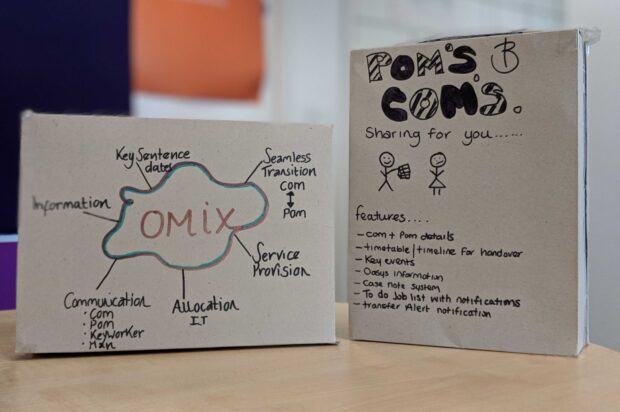Offender Management in Custody (OMiC) is a new policy being introduced to support a rehabilitative culture in prisons. One aspect of the policy is the introduction of the Key Worker role which is well underway across Wales and England.
Our focus has been on the next phase of policy implementation - case management. Since summer last year we’ve been researching the users of potential services to support OMiC case management.
Offenders in prison who've committed serious crimes currently have an Offender Manager based in the community who manages them throughout their time in custody and during their time on licence after release.
This Offender Manager is responsible for the person’s risk assessment and rehabilitation including deciding what interventions the person must complete, evaluating them ahead of any parole hearing, and working with the victim liaison officer where applicable.
By the end of this year, this will instead be done by someone in prison - so there’s lots of recruitment, secondments and training going on in prisons to support this significant change.
So how have we done user research without users?
We’ve used a variety of approaches so far including:
Researching existing processes that are closely comparable to new processes
Our first challenge was to find out how an offender will be allocated to an appropriate Offender Manager with the right skills for the case. Offender Management Units in prisons currently allocate Offender Supervisors to the majority of their sentenced prisoners, so we’ve researched how that’s done, reviewed the new policy and tried to extrapolate from that to identify what our users will need.
Asking our users to get creative
The new policy will see responsibility for an offender transfer from prison to a community-based Offender Manager before their release. To understand needs regarding this handover process we got our future users to design a product for us. Workshop participants came up with some great product ideas in the form of cereal boxes which gave us important insight into the main concerns and what the value of a digital service would be.

Talking to people!
Lots of meetings with subject matter experts in the policy team, research interviews with staff, and attending stakeholder meetings continue to help build our understanding of our future users.
What challenges have we faced?
In the early days, our preamble to the research session was often the first time our participants were hearing the detail of the future policy they’ll be working to. Having a member of the policy team working alongside us has been invaluable to make sure we’re providing correct information.
Despite the fact that OMiC is new, we’re not working in a greenfield site. There are existing information systems used by many different groups of professionals across numerous settings. We’re working increasingly closely with other product teams to coordinate our work and ensure that the future user experience is cohesive.
User research in prisons takes time. The current limitations of technology for staff in prisons means we have to physically travel to conduct research sessions. When there’s only one potential participant in each prison for some research topics, that equates to a lot of elapsed time on each round of research, or fewer participants than we’d like.
The challenges ahead
Evaluating the service with real users and real tasks
We’ll shortly be piloting our first digital offering - an allocation service - at two prisons in Wales. This will be critical to understand how well the service works for users. Up to now its been straightforward to test the completion of individual tasks in the service prototype. But in reality users will be doing many different tasks concurrently, for different offenders all at different stages in their sentence.
Keeping up the pace
The first release of our service will inevitably have issues and we’ll need to continue to learn about our users as they settle in to their new roles and responsibilities. But equally the pressure is on to build more services for our users to facilitate further offender management tasks.
We’re looking forward to seeing how the service works for users at our pilot prisons in Wales, and acting on their feedback to improve it before we roll out to more establishments.
Interested in joining us and working on things that matter? Check out our latest vacancies at Digital & Technology careers
